
THE OFFICIAL JOURNAL OF THE SURREY LAW SOCIETY | WINTER 2023 SurreyLawyer ■ Having Difficult Conversations ■ SLS Training & Events Programme 2023 The Guildford Bombings Inquest – a feature by Alastair Logan OBE., LL.B


2 | SURREYLAWYER XXXXXXXXXXXX
change what you do. Just make it easier to do.
Don’t
management
See how Clio makes legal practice
easier. Discover Clio today at clio.com/uk/surrey-lawyer or call +44-800-433-2546.
PUBLISHER
Benham Publishing


Aintree Building, Aintree Way, Aintree Business Park, Liverpool L9 5AQ Tel: 0151 236 4141 Fax: 0151 236 0440 Email: admin@benhampublishing.com Web: www.benhampublishing.com
PUBLISHED
LEGAL NOTICE
© Benham Publishing.
None of the editorial or photographs may be reproduced without prior written permission from the publishers. Benham Publishing would like to point out that all editorial comment and articles are the responsibility of the originators and may or may not reflect the opinions of Benham Publishing. No responsibility can be accepted for any inaccuracies that may occur, correct at time of going to press. Benham Publishing cannot be held responsible for any inaccuracies in web or email links supplied to us.
DISCLAIMER
The Surrey Law Society welcomes all persons eligible for membership regardless of sex, race, religion, age or sexual orientation.
All views expressed in this publication are the views of the individual writers and not the society unless specifically stated to be otherwise. All statements as to the law are for discussion between members and should not be relied upon as an accurate statement of the law, are of a general nature and do not constitute advice in any particular case or circumstance.
Members of the public should not seek to rely on anything published in this magazine in court but seek qualified Legal Advice.


COVER INFORMATION
Image of Alastair Logan supplied by SLS.

SURREYLAWYER | 3 @SurreyLawSoc @surreylawsociety https://www.linkedin.com/groups/8731473
Joanne
SALES DIRECTOR Karen
Lee
MEDIA No. 1953
ACCOUNTS DIRECTOR
Casey
Hall STUDIO MANAGER
Finney
Winter 2023 © The Surrey Law Society Benham Publishing Ltd.
Contents 16 05 President’s Jottings 07 CEO Report 08 News 11 Judiciary will be fully representative in 120 years 12 The Law Society Report 13 Council Member’s Report 14 Surrey Junior Lawyers Division 16 The Guildford Bombings Inquest 20 Training & Events Programme 2023 22 Search Engine Optimisation (SEO) vs Pay-Per-Click (PPC) campaigns 24 Having Difficult Conversations 26 1 October 2022 PII Renewal for Law Firms 28 Reflections at the end of COP 27 Copy Deadlines 17th MAR 2023 (For APR 2023) 16th JUN 2023 (For JUL 2023) Advertising Anyone wishing to advertise in Surrey Lawyer please contact Catherine McCarthy before the copy deadline. 0151 236 4141 catherine@benhampublishing.com Editorial Anyone wishing to submit editorial for publication in The Surrey Lawyer please contact Helen Opie before the copy deadline. 0333 577 3830 helen.opie@surreylawsociety.org.uk Follow us on social media 28 24 20
KEY OFFICERS
President
MADELEINE BERESFORD
TWM Solicitors LLP, 65 Woodbridge Road, Guildford, Surrey GU1 4RD Tel: 01483 752742 Email: madeleine.beresford@twmsolicitors.com
Hon. Secretary
KIERAN BOWE
Russell-Cooke Solicitors, Bishops Palace House, Kingston Bridge, Kingston upon Thames, Surrey, KT1 1QN DX 31546 Kingston upon Thames Tel: 020 8541 2041 Fax: 020 8541 2009 Email: kieran.bowe@russell-cooke.co.uk
Hon. Treasurer
CLAUDENE HOWELL
Owen White & Catlin LLP, 74 Church Road, Ashford, Middlesex TW15 2TP T: 01784 254188 E: claudene.howell@owc.co.uk
COMMITTEE MEMBERS
NICK BALL
TWM Solicitors LLP, 65 Woodbridge Road, Guildford, Surrey GU1 4RD Tel: 01483 752700 Email: Nick.Ball@twmsolicitors.com
CARINA BRITS
Palmers Solicitors, 89-91 Clarence Street, Kingston upon Thames, Surrey KT1 1QY Tel: 020 8549 7444
Email: carina.brits@palmerssolicitors.co.uk
KAREN GRIMM
Stone Rowe Brewer LLP 72 High Street, Teddington, Middlesex, TW11 8JD Tel: 020 8977 8621 k.grimm@srb.co.uk
MARALYN HUTCHINSON
Kagan Moss & Co, 22 The Causeway, Teddington TW11 0HF Tel: 020 8977 6633 Fax: 020 8977 0183
Email: maralyn.hutchinson@kaganmoss.co.uk
RACHEL PHILIP
S. Abraham Solicitors, 290A Ewell Road, Surbiton, Surrey KT6 7AQ
Tel: 020 8390 0044
Email: conveyancing@sabrahamsolicitors.co.uk
JAMES SCOZZI
Elite Law Solicitors, 1 Fetter Lane, London EC4A 1BR DX: 14 London Chancery Lane Tel: 020 3440 5506 Fax: 01923 219416 Email: jscozzi@elitelawsolicitors.co.uk
LAW SOCIETY COUNCIL MEMBERS
SUSHILA ABRAHAM
S Abraham Solicitors 290A Ewell Road, Surbiton KT6 7AQ Tel: 020 8390 0044 Email: office@sabrahamsolicitors.co.uk
ALASTAIR LOGAN
Pound House, Skiff Lane, Wisborough Green, West Sussex RH14 DAG Email: alastairdwlogan@btinternet.com
Chief Executive & Magazine Editor
HELEN OPIE
Surrey Law Society, c/o Russell-Cooke Solicitors, Bishop’s Palace House, Kingston Bridge, Kingston-upon-Thames, KT1 1QN Web: www.surreylawsociety.org.uk Tel: 0333 577 3830 Email: helen.opie@surreylawsociety.org.uk
SUB-COMMITTEES
CONVEYANCING & LAND LAW
Rachel Philip Carina Brits Maralyn Hutchinson Ema Jones Martin Whitehorn
EQUALITY, DIVERSITY & INCLUSION
Emma Patel
Victoria Clarke Amber Howton Alastair Logan Linda Lusingu Amber Matheson Maria Mingoia James Scozzi
FINANCE
Claudene Howell Nick Ball Maddie Beresford Kieran Bowe Helen Opie
PRIVATE CLIENT
Kieran Bowe Maddie Beresford Jess Buttaci
QUO VADIS
Claudene Howell Nick Ball Maddie Beresford Kieran Bowe James Scozzi Helen Opie
SOCIAL
Madeleine Beresford Claudene Howell Daphne Robertson Gerard Sanders Helen Opie Kim Wintle
SURREY JUNIOR LAWYERS DIVISION
Kim Wintle (Chair)
Martin Whitehorn (Vice Chair) Katrina Burrows Ellie Duke James Fry Mona Gholami Seema Gill Sapphira Gold Bisma Hussain Tabitha Lee Amber Matheson Daniella Mcleod Alex Milson Emma Smart Bethany Walker Daisy Welland
Email: surreyjuniorlawyersdivision@gmail.com LinkedIn: https://www.linkedin.com/company/ young-surrey-lawyers
Instagram: jld_surrey Twitter: @YSL_Live / @SurreyJLD
4 | SURREYLAWYER OFFICERS
19th December 2022 marked 100 years since Carrie Morrison was first admitted to the roll of solicitors. She was the first woman to qualify as a solicitor, closely followed by Maud Crofts, Mary Pickup and Mary Sykes. Since then, many more have followed in their footsteps, and today more than two thirds of applicants entering the profession are women.
On 7th December I had the honour of attending The Law Society’s celebration of 100 Years of Women Solicitors, hosted by Amandeep Khasyria, Vice Chair of the Women Solicitors Network, in Chancery Lane. I hope that some of you were able to watch via the live stream.
We enjoyed hearing from the Attorney General the Rt. Honourable Victoria Prentis MP reflecting on how far the profession has come over the last century. Even if we may have further to go to see parity in senior positions, it is still worth celebrating the huge progress that has been made, with 53% of practicing solicitors now being female.
We heard from Dana Denis-Smith, CEO at Obelisk Support, Founder of First 100 Years, and Law Society Council Member. It was fascinating to hear how others started to pave the way before Carrie Morrison’s qualification, and how it was actually initiated thirty years prior, in the late 1800s. A father, without any sons to pass his practice on to, requested permission to train his daughter as a solicitor. He was told that it was unlawful, and even then, this was met with public and media outrage at the injustice of the legal position.
President’s Jottings
WINTER 2023
Last to speak was Law Society President Lubna Shuja, who we were delighted was able to join us for our Awards evening back in September. Lubna is the seventh female president of the Law Society. Her presidency marks the first time there have been two consecutive female presidents, taking over from I Stephanie Boyce, who was the first black woman to hold office. Lubna is also the first Muslim and first Asian president of the Law Society. Her passion for removing barriers to the profession, whatever the barrier may be, has been evident each time I have heard her speak. I am looking forward to seeing how things will continue to evolve throughout my career, and what the future of the profession will be.
Thank you for supporting Surrey Law Society through 2022, and we look forward to continuing to represent you in 2023. In the meantime, I hope you enjoy the festive period and all the best for the New Year. �
Madeleine Beresford President
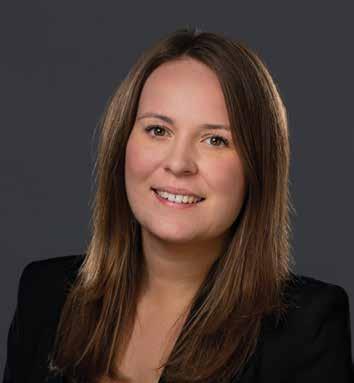
SURREYLAWYER | 5 INTRODUCTION
Madeleine Beresford
Are online auctions holding their popularity?

hile online auctions have been around for some time, it wasn’t until the global pandemic in 2020 that things started to pick up. Many of us were mid-auction cycle when Westminster announced the country was going into lockdown and, for those that had already embraced online auctions, switching to the web allowed us to continue trading with limited disruption.
During this time the auction landscape threatened to change dramatically. Many thought we would need to reinvent the wheel or rely on the modern method of auction to continue trading – however in reality the fundamental principles of buying and selling by auction remained the same and the online platforms opened a world of possibility.
This isn’t to say that the transition was easy – many of us spent several days and nights reviewing and implementing new software, hardware, and every other measure that had, up until now, been the domain of IT specialists. Countless hours have also been spent, and are still being spent, on user experience, data flow, security, and every other aspect of making the online experience one that is just as transparent and easy as bidding in the room.
For many businesses, success is closely connected to reach. When selling a product online retailers have the advantage of advertising across the globe before picking and packing a product and dispatching it to a selected location but, how does this work for a static object like land or property? Yes, we can advertise across the globe and yes there have been other ways of bidding by proxy in the past, but none have ever been as effective as the online bidding platforms now on offer.
These online systems allow you to view the property details, the legal documents and, in many cases, a walkthrough video, all before allowing you to login and bid from wherever you are in the world without even having to pick up the phone or even transfer money in advance.

Our last auction saw traffic from over 40 different countries with bids coming in at all times of day and night, so, from a reach perspective, online auction would be hard to beat.
Security and anti-money laundering (AML) checks are also made simple, being done online in the
comfort of your own home or office during the registration process, and indeed the flow of information for completing due diligence along with sending out Addendum notes or any other information can all be done from one place. So, in summary, online auctions work and they work well.

While it is easy to get carried away with the advantages of buying or selling online, from wherever you might be in the world, it is still important to remember that ballroom auctions have some distinct advantages. The strength of socialising and networking at these events cannot be overlooked –seeing, discussing, and even feeling the buzz of an auction room has always been a great way to learn, share knowledge or find new opportunities. Something that perhaps will be lost without that kind of physical interaction.
In my opinion online is here to stay and that’s a great thing. The one thing that has become more evident from these last few years is the ability and willingness to adapt – not only to a changing market but a changing world. The auction sector may still be a comparatively small element of a larger property market, but it makes a lot of noise.
The momentum provided by the seismic shift in the way auctions are conducted needs to continue to be harnessed. We all need to continue to adapt and now is the time to combine the best of both worlds, to create opportunities for buyers and sellers and for them to choose how they want to interact with auctions in the future.
In my opinion online is here to stay and that’s a great thing. The one thing that has become more evident from these last few years is the ability and willingness to adapt – not only to a changing market but a changing world. The auction sector may still be a comparatively small element of a larger property market, but it makes a lot of noise.


The momentum provided by the seismic shift in the way auctions are conducted needs to continue to be harnessed. We all need to continue to adapt and now is the time to combine the best of both worlds, to create opportunities for buyers and sellers and for them to choose how they want to interact with auctions in the future. �

6 | SURREYLAWYER ADVERTISEMENT FEATURE
ENTRIES INVITED EXPERIENCE the excitement of SELLING by auction Entries are continually invited for our auctions which are scheduled throughout the year. We are only an email, click or call away • auctions@cliveemson.co.uk • cliveemson.co.uk • 0345 8500333
you would like to arrange a no obligation appraisal please do not hesitate to contact us or complete our form at cliveemson.co.uk/selling/. Local Knowledge - National Coverage Surrey Lawyer - November 2022.indd 1 03/10/22 10:36:18
If
W
CEO Report
WINTER 2023
As I write this, we are nearing the end of a very busy year at Surrey Law Society, it’s snowing outside and everyone is gearing up for Christmas. However, by the time you receive the magazine the festive period will be over and 2023 upon us; I hope that you all had a welldeserved break over the holidays and enjoyed time with family and friends away from the desk.
2022 has been a fantastic year for Surrey Law Society, and we hope that you have felt the benefits of your membership over the past 12 months. It’s hard to believe that at the beginning of the year the country was still in the grips of the pandemic and as we made plans for the early part of 2022, we were still unsure about the viability of some in-person events; we’re delighted that in the end we were able to provide a full programme of activity for you.
The Society hosted over 10 webinars in 2022 covering a variety of topics including CQS, the Family Solutions Initiative, Contested Wills and Estates, No-Fault Divorce, Cohabitation Claims & Property Disputes for Unmarried Couples and Mortgage Lending Requirements for Conveyancers. These sessions were available free of charge to SLS members, and we hope that you felt they represent excellent value for your membership of the Society. We supplemented the webinar programme with longer online courses on Protecting you and your Client – Guidance for Residential Conveyancers, Pensions and Life Policies in the Context of Estate Planning and CryptoAssets in Divorce & Separation. We were also thrilled to resume our inperson training, holding 5 courses, this year at TWM’s offices in Guildford, with an excellent offering of speakers, Professor Lesley King, Robert Jamieson, John Bunker, Stephen Desmond and David Keighley.

2022 saw the continuation of our collaboration with Surrey Junior Lawyers Division on the Supporting Surrey programme, which this year focused on mental wellbeing, and we hosted 3 webinars for members of both organisations that looked at Work Life Balance, Imposter Syndrome and Having Difficult Conversations. Each webinar was followed up with an article in the Surrey Lawyer, the most recent of which can be viewed later in this issue. Don’t forget that you can also view recordings of the webinars on the Surrey Law Society’s vimeo channel.
We were also delighted to have run all our scheduled social events for the year including the highest ever attendance at our annual go-karting event, the Past President’s Championship Cup. We received more nominations than ever before at our SLS Legal Awards and enjoyed a fantastic evening celebrating the work of members in September, with an excellent afterdinner speech from Clive Anderson. In March, we honored the contribution of our dear friend John Perry, at the Society’s inaugural John Perry Memorial Dinner. The evening was full of warm memories of John, and we were delighted that his wife Rosemary and daughter Lucy were able to join us on the night. We concluded our social events programme with the Legal Brain of Surrey Quiz, held in November at the Weyside in Guildford, and you can read more about that evening later in the magazine.
All the above activity would not have been possible without the generous support of our Surrey Law Society patrons, and we’re thrilled that 2022 saw the Society forge partnerships with more annual patrons than ever before. I would therefore like to extend my warm thanks to each and every one of them for their continued support and for the numerous contributions that they have made to the Society’s training and events throughout the year. They are:
2022 also saw the creation of the Surrey Law Society’s ED&I Committee, and it is great to see this group going from strength to strength. The committee has been extremely active over the year and has organised a free webinar for members in March on Workplace Diversity and Inclusion which was delivered by the excellent Mary Eniolu, created an EDI Calendar, scheduling informative social media posts on key dates to provide information about the importance of certain religious festivals and inclusivity initiatives, as well as attending the Pride in Surrey parade in August. The Society has also introduced a Focus on EDI section to the Surrey Lawyer magazine, and we hope that you have found the articles included in the past year informative. If you have any content that you would like for us to include in the Focus on EDI section, please do send this to me. Moving forward, the EDI Committee has great plans including an initiative to engage with secondary school children, to encourage a career in the law for everyone, irrespective of factors such as background, race, ethnicity, gender and we look forward to sharing more on this shortly.
In March, we were delighted to take on Elouise as the Society’s Membership and Events Coordinator. Elouise joined us through the Government’s Kickstart Scheme and has proved to be a great asset to the team. The Society also took on a shared office space at this time and Elouise and I can be found there on Mondays and Thursdays, so if you are ever in Sutton and would like to come and visit us, please do get in touch.
As we look to the future, the Society has some exciting projects in the pipeline, including a new website and members only area, as well as new full programme of training and events, which you can view in this magazine. We’re also looking to increase our committee so that we can engage in many more new initiatives, so if you’re interested in helping the Society to build on its existing work, we would love to hear from you.
overall a very busy year indeed, and all that remains is to
all a wonderful Christmas and New Year; I hope that you are feeling refreshed and ready for 2023 by the time you read this. ■
SURREYLAWYER | 7
So,
wish you
Helen Opie Chief Executive & Magazine Editor T. 0333 5773830 E. helen.opie@surreylawsociety.org.uk @SurreyLawSoc @surreylawsociety Helen Opie (Chief Executive at Surrey Law Society) LinkedIn SLS Group https://www.linkedin.com/groups/8731473
■ Chadwick Nott ■ Conscious Solutions ■ Evelyn Partners ■ Finders International ■ Howden ■ Landmark Information Group ■ LawSure Insurance ■ Moneypenny ■ Tower Street Finance INTRODUCTION
Helen Opie
Stevens & Bolton announces new partner hire

Firm expands corporate tax practice with new hires from Irwin Mitchell
National independent law firm Stevens & Bolton LLP has today announced the appointment of Sarah Cardew as a Partner in its corporate tax and incentives practice, continuing its recent run of lateral hires.
Previously Head of Corporate Tax at Irwin Mitchell, Sarah has extensive experience advising clients across the corporate, real estate and commercial tax landscapes, advising on a broad spectrum of issues relating to mergers and acquisitions, stamp duty land tax, capital allowances, and VAT. As a member of the Law Society’s VAT and Duties sub-committee, her insight is also often sought on draft VAT legislation. In addition, she brings a breadth of experience advising on employment tax structures, including termination payments, IR35 issues, and Managed Service Company issues.
Sarah’s appointment comes at a time of great ambition at the firm with Sarah joining high-profile recent hires Caroline Delaney from Rosenblatt, Andy Williams from Charles Russell Speechlys, Gareth Walliss from Shoosmiths and Heidi Sawtell from Talbot Walker. Sarah’s arrival brings the total number of partners at the firm to 45 and comes after a strong set of financial results, with the firm announcing its 12th year of consecutive growth as well as increases across the board in turnover, net profit, and profit per equity partner (PEP).
Commenting on the appointment, Kate Schmit, Head of Corporate Tax and Incentives at Stevens & Bolton LLP, said: “We are delighted that Sarah is joining the team, her expertise across a breadth of sectors will help further grow our top ranked corporate tax practice and help the firm go from strength-to-strength.”
Managing Partner, James Waddell, added: “We have bolstered our all equity partnership this year with five excellent hires and two fantastic internal promotions. Sarah and her practice are a great fit for our firm and we will add strength in depth to our highly regarded corporate tax practice. We are thrilled to have Sarah join us.” ■
TWM Solicitors strengthens commercial law practice with Guildford partner hire
As part of our long term strategy to enhance and broaden the expertise that we can offer our clients, Laurie Heizler joins us as a Partner in the Business Law team based in the firm’s Guildford office.

Laurie specialises in commercial law and intellectual property (IP) matters, including drafting and advice on IP licences, sponsorship, joint ventures, research & development, nondisclosure agreements, IT contracts, agency, distribution and manufacturing agreements, internet sales terms and policies and standard terms and conditions.
Laurie’s IP work includes both contentious and non-contentious matters and it is anticipated he will support our colleagues in Dispute Resolution, advising on disputes relating to patents, trade marks, designs, copyright and confidential information.
Laurie has expertise across a range of sectors, including technology businesses, media entities, brand owners and manufacturers and distributors in all sectors, ranging from brand-leading international businesses to SMEs, start-up enterprises and creative individuals. He has also acted for several household names in the world of consumer goods.
David Powell, Head of the Business Law team, comments: “It gives me great pleasure to welcome Laurie to TWM and to the Business Law team. He is a highly rated practitioner with considerable commercial law experience and extensive expertise in IP matters. Importantly for us, Laurie’s appointment further enhances the range of capabilities we offer and underlines our commitment to continuing to deliver our first-class quality full service offering to clients, in a cost-effective manner.”
Laurie Heizler comments: “TWM is a great platform for my commercial law and IP expertise which is ideal for my numerous contacts in London and Surrey. I am pleased to be joining TWM’s highly regarded Business Law team at a very exciting time in the firm’s long history.” ■
8 | SURREYLAWYER NEWS
Sarah Cardew
Laurie Heizler
New Managing Partner announced at Morr & Co LLP
Leading regional law firm Morr & Co has announced that Managing Partner Paul Harvey has decided to retire on 31st March 2023. Paul will be succeeded by current Partner and Head of Dispute Resolution Catherine Fisher.
Catherine will take responsibility for the overall management and leadership of the firm, overseeing the firm's strategy and continuing to deliver Morr & Co’s ambition to be the best law firm in the region for both its clients and employees.
Paul Harvey joined the firm in 1988 and has been the Managing Partner for the last 14 years. During this time, he has helped guide the firm through a period of significant growth and modernisation, continuing the firm’s transformation from a high street practice to a significant regional player.
Catherine Fisher joined Morr & Co as a partner in 2015, since which time she been the Head of Dispute Resolution. Catherine has been an integral member of the firm’s Senior Management Team and has been involved in creating and implementing the firm’s strategy, as well as leading several important projects.
Paul commented “I joined the firm back in 1988 and have had the great honour of serving as Managing Partner for the last 14 years. I believe that now is the right time for me to move on into the next phase of my life and the right time for firm also.
It has been a great privilege and I very much appreciate the trust that my colleagues have placed in me. What has made the decision to retire easier is the knowledge that I leave behind a team of excellent people who will continue to provide the great service that we have sought to provide in the past.
I am delighted that Catherine Fisher has agreed to succeed me as Managing Partner. I have every trust and confidence in Catherine and the rest of the Partners to take the firm forward into the future.”
Catherine Fisher added “Everyone at Morr & Co is incredibly grateful to Paul for his complete commitment to the firm over the last 14 years. His vision has led the firm through a period of significant growth and change; and he has successfully brought us through some exceptionally difficult periods, including the 2008/2009 recession and the COVID pandemic.
It will be an honour to lead Morr & Co into the next chapter of its long history. We have a team of extremely talented people across the business, and together we will continue the growth and evolution of Morr & Co”.
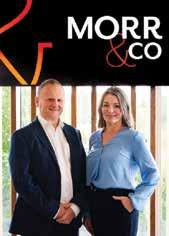
The transition of leadership has been underway for some time, and over the coming months Paul and Catherine will continue to work closely together to ensure a smooth transition. ■
GBH appoints Associate Director to expand employment offering
Surrey-based GBH Law, which specialises in advising business clients, has expanded its team with the appointment of a new associate director, Helen Stone, who has joined the firm’s employment team.

Helen trained at Linder Myers Solicitors (formerly Shammah Nicholls) in Manchester and qualified in 1998. Over the past 24 years, Helen has gained experience in regional firms and, more recently, as an in-house employment lawyer for a global consulting and engineering firm. She has amassed a wealth of experience in all aspects of employment law, both in the UK and abroad.
“I’m thrilled to have joined an award-winning and respected firm like GBH Law. I am really looking forward to working with Hamish Cameron Blackie, Andrea Tishler, and Ashley Holden who have such established reputations across the southeast, and I am excited to help them drive the employment practice forward and to achieving the best results for every client,” Helen said.
Hamish Cameron Blackie added: “GBH Law continues to grow and expand our team of experienced lawyers ensuring that we can offer the very best legal advice and service to our business clients. We are all pleased to have Helen on board and look forward to growing together and seeing what the next twelve months brings.” ■
SURREYLAWYER | 9 NEWS
Helen Stone
Paul Harvey and Catherine Fisher
Moore Barlow unveils brand refresh
solid financial growth
Southeast law firm Moore Barlow has unveiled a major brand refresh as it looks to capitalise on a period of sustained financial growth.
The partial rebrand is built around the firm’s new strapline ‘Who cares wins’ and the firm’s ethos that lawyers who care about their clients, not just the law, deliver better results. Alongside the new strapline, the firm will use a new creative approach to tell the stories of what they do for their clients. The anonymous stories will use a witty, attention-grabbing tone and focus on the people and businesses behind them.
The launch comes as the firm, which was created from the merger of Moore Blatch and Barlow Robbins in 2020, published its latest set of financial results, delivering 9% year-on-year growth in the 12 months to the end of April 2022 and nearly £40m (£39.6m) in revenue.
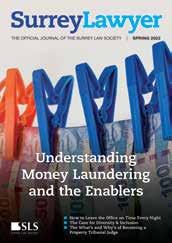
Ed Whittington, managing partner at Moore Barlow, said: “Such strong financial performance so early on in our firm’s journey is a massive endorsement of the talent we have in the business and the drive of each and every one of those people. It gives us the platform we need to invest in our people and step out in our own direction. What’s just as pleasing to me is that we are realising together the type of business we want to be.”
“Revamping the brand is about more than just how we connect with clients. It’s about cementing the values that we have arrived at together as a firm, and engaging with our people to take on board their views and ambitions. I’ve been very conscious all
along that we create an ethos and a brand identity that reflects the people that work at Moore Barlow and is something they truly believe, because they are the brand as much as anything we could say or do. Ultimately, if we care about our people and they deliver an even better service to our clients as a result, then that makes them better lawyers and Moore Barlow a better law firm.”
Tom Newman-Young, chief marketing officer at Moore Barlow, added: “Our mantra from day one was that we want to be the antidote to the typical ‘city firm’, both culturally and in how we engage with and deliver for our clients. ‘Who cares wins’ typifies that approach – we’re focused on nurturing our people and giving them a better work/life balance than they might get elsewhere, and we recruit lawyers that buy into an ethos of being just as passionate about their client relationships as they are about the law.”
The result of the nine month-long project includes a bolder brand style and colour palette, which is reflected in a refreshed website, along with a new direction for Moore Barlow’s marketing that talks to ‘Who cares wins’. The project was headed up by veteran brand strategists Craig Mawdsley and Bridget Angear, who founded the consultancy Craig+Bridget after leaving one of the UK’s top ad agencies, AMV BBDO. The creative work was developed by award-winning Auckland-based creative director Wayne Pick, working alongside renowned copywriter Olga Pope.
The 500-strong law firm has six offices in London’s Cheapside, Richmond, Guildford, Woking, Lymington and Southampton. ■
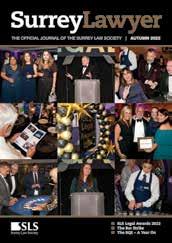
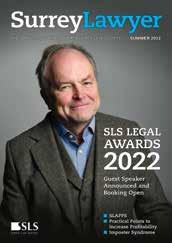

10 | SURREYLAWYER NEWS
following
To advertise in Surrey Lawyer, please call Catherine McCarthy our Business Features Editor on 0151 236 4141 or email catherine@benhampublishing.com Want to feature in Surrey Lawyer?
New research by the Law Society of England and Wales has today found it will take more than 120 years before women, Black and Asian people are properly represented within the judiciary if things continue the way they are.
Law Society President Lubna Shuja said: “As we near the end of Black History Month, which this year focuses on ‘action, not words,’ it is unacceptable that Law Society research has found it could take over 120 years for women, Black and Asian people to represent the society they serve on the bench.
“Black judges currently make up just 1.09% of the judiciary, compared to 1.02% in 2014. At that rate, it would take until 2149 for the proportion of the judiciary who are Black to match current estimates for the general population (3.5%).”
It is not only Black candidates who are being held back by the glacial progress of diversity on the bench, but Asian and women judges too.
Asian judges currently make up 4.79% of the judiciary. This is up 2.53% compared to 2014.
Judiciary
If this rate continues, it is estimated it would be 2033 before the percentage of Asian judges would match the general population (8%).
Women make up around a third of judges. Current trends predict it will be another decade before half of the judiciary are women.
Lubna Shuja concluded: “We need a judiciary that truly reflects our diverse society. We must take action and make real, lasting change so our judges can represent the people who come before them in court.
“We urge the UK government to address the structural barriers that are holding back talented candidates.
“We know that progress does not happen overnight, however, we cannot wait over 120 years for women, Asian and Black judges to be fully representative on our court benches.
“We owe it to the public – who often use the judicial system at times of great stress – to at least have judges who represent and can relate to them.” ■


SURREYLAWYER | 11 EQUALITY, DIVERSITY & INCLUSION
will be
representative
120 years Membership details: Annual Subscriptions: £98 per person, per year Corporate Subscriptions: £1,850 per year (20+ fee earners) Solicitor: £60 (not in private practice) Solicitor: £35 (not practising) Honorary Membership: Free Associate Membership: Free – no voting rights To apply for membership please contact: Helen Opie, Chief Executive Surrey Law Society c/o Russell-Cook Solicitors Bishop’s Palace House, Kingston Bridge, Kingston-upon-Thames, KT1 1QN Web: www.surreylawsociety.org.uk Email: helen.opie@surreylawsociety.org.uk Tel: 0333 577 3830 Society Membership
fully
in
The Law Society
By Beth Quinn, Key Account Manager, The Law Society

CRIMINAL JUSTICE
Cuts to legal aid will bring chaos to criminal justice
The Law Society has responded to the government’s final response to the Independent Review of Criminal Legal Aid. The review recommended a 15% rate increase for solicitors but the government’s package only amounts to 9% rising to 11% in 2024, which is a real terms cut.

The justice secretary has completely rejected the advice of the government’s own independent review of the crisis in the criminal justice system by imposing a cut on fees that have been frozen since the 1990s.
The number of duty solicitors and criminal legal aid firms continue to fall at an alarming rate – with several police station schemes on the verge of collapse. Law Society analysis suggests that the number of duty solicitors will decrease by another 19% by 2025 (687 fewer duty solicitors) and the number of firms doing criminal legal aid work will decrease by 16% (150 fewer firms), leaving many people without access to a lawyer when they desperately need one.
The Law Society has warned those entering the profession considering a career in criminal defence practice is that, given the current situation with criminal legal aid, it is highly unlikely that they will be able to generate a professional income from this work. Solicitors are under a professional obligation to make sure they manage risks to the financial stability and business viability of their practices. It will be for each firm to make its own assessment as to its own individual circumstances. For many firms, continuing with a criminal defence practice in the absence of the basic funding Bellamy identified as essential for sustainability may be incompatible with their professional obligations.
The Law Society will continue to explore options for saving the system, including a legal challenge of the decision.
■ Read our Press Release at www.lawsociety.org.uk/contactor-visit-us/press-office/press-releases/raabs-cut-to-legalaid-will-bring-chaos-to-criminal-justice
■ Read the government response at www.gov.uk/ government/consultations/response-to-independentreview-of-criminal-legal-aid
■ Further information on the looming crisis facing criminal duty solicitors at www.lawsociety.org.uk/campaigns/criminaljustice/criminal-duty-solicitors
■ Law Society practice note on rejecting un-remunerative publicly funded criminal work at www.lawsociety.org. uk/topics/criminal-justice/rejecting-un-remunerativepublicly-funded-criminal-work
REGULATORY
Changes to the Legal Ombudsman’s Scheme Rules
The Legal Ombudsman (LeO) recently announced its Scheme Rules will be amended from 1 April 2023. Firms should consider any internal changes that may be required so that these may be in place by 1 April.
Over the coming months LeO will be drafting and publishing guidance, including FAQs, on the Scheme Rules changes to ensure that firms and members of the public are aware of how the changes might impact on them or their complaint.
SRA launches a new consultation on the future of the Solicitors Indemnity Fund
The SRA has launched a new consultation on the future of the Solicitors Indemnity Fund (SIF) and post six-year run-off cover (PSYROC). The new proposals would retain the current levels of protection but close the independent company that manages SIF – bringing a PSYROC scheme in-house.
■ Read more about the Law Society’s position at www. lawsociety.org.uk/campaigns/consultation-responses/ sra-consumer-protection-for-post-six-year-negligence
DIVERSITY & INCLUSION
New Law Society diversity and inclusion framework
Often there is a leap to action on diversity and inclusion – a sense of urgency to ‘do something’. This can lead to activity that is reactive to immediate pressures, short lived or not properly resourced. The Law Society’s new D&I framework encourages you to take a systematic approach and embed D&I in a way that has a lasting impact.
The framework guides individuals through three steps to develop and deliver a strategic approach and action plan. We have included an action plan template, as well as links to additional guidance and resources for more detailed help. If you are already taking action, it will help you review and identify any gaps or areas for ongoing improvement.
■ Read more at www.lawsociety.org.uk/topics/diversity-andinclusion-framework
New research into male mental health in the legal profession
LawCare recently published its findings relating to male mental health within the legal profession. The legal mental health charity released the findings of its all-male focus group which took place on 19 July 2022 in a bid to better understand the needs of men in law and the mental health support they need in the workplace.
The focus group was composed of a diverse range of barristers, partners, mid-level and junior associates, in-house lawyers and those in support roles from across a range of jurisdictions.
12 | SURREYLAWYER REPORT
Beth Quinn
■ Download the report at https://protect-eu.mimecast.com/s/ TEajC8MJOHXBzl7un8dyt?domain=lawcare.org.uk
Mental Health Act figures show disproportionate impact on Black British people
Annual statistics on the Mental Health Act have revealed that Black British people are still disproportionately affected in terms of detention and treatment compared to white people.
Detention rates for Black British people were over four times those of white people, while Community Treatment Orders (CTOs) – which require a person to receive supervised treatment in the community – were used for Black British people at 11 times the rate of white people.
The Law Society has called for the government to ensure that people subject to a CTO still receive an automatic referral to the Mental Health Tribunal if they are recalled to hospital and kept there for treatment. ■
Council Member’s Report
We saw in October 2022 the new President Lubna Shuja take office and our congratulations to her. We thank the outgoing President I Stephanie Boyce for all she has done during the 19 months of her Presidentship of the Law Society. We also now have a new Chief Executive of the Law Society Ian Jeffery who is also a Solicitor and congratulate him on his appointment.
The President Lubna Shuja’s vision for the Law Society is for it to be “a leading and influential voice on justice, the rule of law and the value of solicitors. professional ethics. business support –listening to you”.
Just as we approach the end of 2022, we see a number of changes imposed on the profession and the uncertainties for our legal aid practitioners and in the area of criminal work. These are very unsettling times for the profession especially the future of our criminal legal aid firms. No doubt you would have seen the Government’s response to the Bellamy legal aid review which came out on 30 November 2022. The President has had robust discussions with the Lord Chancellor about this. She has also discussed concerns about the proposed Bill of Rights
which has been pointed out by more than 30 large City law firms of its detrimental impact on the UK. They have raised issues about the unintended consequences of some of the provisions of the Bill, particularly around the impact on the UK’s economic competitiveness and the standing of the English and Welsh law and jurisdictions internationally.
Please do continue to respond to consultations as it is vital that our voices are being heard. I would also like to inform you that I have been elected to the Law Society’s Board as a Member of the Board.
As always, if you have any matters that you wish to raise with the Law Society then please do not hesitate to contact me or Alastair. In the meantime, and as we approach Christmas, I would like to take the opportunity of wishing all of you a Merry Christmas and a very prosperous 2023. ■
Sushila Abraham Council Member and Board Member of the Law Society

SURREYLAWYER | 13 REPORT
Sushila Abraham
Surrey Junior Lawyers Division

By way of a short introduction, my name is Kim Wintle, and I am the new chair of Surrey JLD and Surrey Law Society representative.
In November, we said goodbye to the 2021/22 committee and hello to our new committee. I would like to say a massive thank you to all of the old committee who worked incredibly hard over the past year to make Surrey JLD a huge success. And special mention must go to our outgoing chair, Martin Whitehorn for all his hard work and determination during his term as Chair.
I am very lucky as Martin will be remaining on the 2022/23 committee as Vice Chair and National JLD Representative, so he will continue to support me during my term as Chair.
I would like to say a very warm welcome to our new committee of 16 individuals. Some are returning from last year and for some this is their first year on the committee. We have met once, so far, and already I can see how enthusiastic everyone is and we all want to make the next year a bigger and better.
I am looking forward to working alongside SLS over the next year!
Well, what a year 2022 has been for Surrey JLD! With the lockdowns finally coming to an end we have been able to host a wide range of in person events, meet lots of our new members and continue to support aspiring and junior lawyers. We already have so much more planned for 2023, it is going to be a very exciting year!
On Friday 10 February 2023, we are hosting our very first Ball! The event will take place at Guildford Harbour Hotel from 7pm and is kindly being sponsored by Elite Law Solicitors and Morr & Co. This is going to be our biggest event yet and we will be raising money for the Emily Ash Trust. We hope to see lots of you there!
Finally, on behalf of everyone at Surrey JLD, I wish you all a Merry Christmas and a Happy New Year! ■
2022/23 Committee
Chair & Surrey Law Society Representative Kim Wintle
Vice Chair & National JLD Representative Martin Whitehorn
Secretary Daisy Welland
Treasurer & SQE Representative Seema Gill
Sponsorship & Digital Marketing Representative Bisma Hussain
Charity and Social Media & Publications Representative Alex Milson
Events Representatives Amber Matheson, Katrina Burrows
Diversity & Inclusion Representative Mona Gholami
Social Media & Publications Representative Tabitha Lee
Wellness Representatives
Daniella Mcleod, Ellie Duke
In-House Representative James Fry
Career Changer Representative Sapphira Gold
Universities & Colleges Representative Bethany Walker
ULaw Representative Emma Smart
Common misconceptions about joining Surrey JLD
‘Only junior solicitors can be members’
While some local JLD groups might only admit solicitors, that is not the case with us. In short, if you’re part of the junior legal community you’re a member. That includes whether you’re a student, graduate, paralegal, legal executive, conveyancer, costs lawyer, trainee solicitor, solicitor apprentice, solicitor of up to 5 years’ PQE, pupil barrister, junior barrister of up to 5 years’ practice or otherwise trying to progress into and through the early stages of law.
‘I need to both live and work in Surrey to be a member’ Not so. We welcome those who live and/or work in and around Surrey. Some of our committee members live and/or work in Hampshire, East Sussex and South London and we have had junior lawyers attend our events from Berkshire, Devon and London, so don’t feel you are excluded.
‘I need to pay a membership fee to participate’ Unlike other JLDs we do not charge a membership fee. So far all of our virtual events have been free of charge, while in-person events are subsidised by sponsorship, meaning you pay a nominal amount to attend. ■
14 | SURREYLAWYER REPORT
TWM Solicitors crowned champions of the Legal Brain of Surrey Quiz


Surrey’s favourite annual quiz returned to the SLS calendar on 17th November, as the Legal Brain of Surrey Quiz took place at The Weyside in Guildford. Teams enjoyed platters of food and battled it out for victory over 10 rounds of general knowledge questions including rounds on entertainment, current affairs and sport. In addition, attendees deciphered pictures, considered a ‘connections’ round and tested their nerve with a final ‘Wipeout’ section where they could risk all their points in that round if they answered a full house of questions, resulting in 5 bonus points! Sadly, a good number of teams fell at the final hurdle by misspelling ‘Minuscule’. In the end it was ‘Surrey’s Premier Law Firm’ from TWM Solicitors who reigned victorious and took home the Mike Coverley Challenge Cup, but all our teams did fantastically well.
As always, we would like to thank our sponsors for the evening Evelyn Partners, Landmark Information and Tower Street Finance, which enabled the event to go ahead. The quiz followed our Annual General Meeting, which also took place at the Weyside as well as online via Zoom and saw our President Madeleine Beresford and Committee elected in for the year 2022-23. ■
The new legal competitive advantage
What should law firms prioritise as we move toward 2023? As new research from legal software provider Clio reveals, the answer above all else is adaptability. Ever-evolving working habits, new client expectations, and challenging market conditions mean that standing still in today’s landscape is the same as going backwards.
Clio’s brand-new Legal Trends Report shows just how profound an impact this constant change is having on law firms. It also highlights how firms can make themselves adaptable (and even antifragile) by adopting legal technology. The right solutions will allow law firms to meet both their clients’ and staff’s expectations –which will play a key role in helping law firms survive in what may be turbulent times ahead.

Why firms must adapt to lawyers’ changing working habits The pandemic forever changed how lawyers want to work. Indeed, the 2022 Legal Trends Report shows that:
� 44% of lawyers are more likely to want to work throughout the day rather than a traditional 9-to-5 schedule � 45% prefer meeting clients virtually � 49% of lawyers say they prefer to work from home
Client expectations also continue to change
While firms must increasingly cater to their lawyers’ working preferences (especially if they want to keep hold of top talent), client demands are also a paramount concern. The Legal Trends Report found that:
� 35% of clients prefer virtual meetings, compared to 28% who prefer meeting in person � 70% of consumers want the option to pay a lawyer via a payment plan � 68% want to communicate with their lawyers over the weekend
The solution? Cloud-based legal software
Cloud-based legal software plays a vital role when it comes to law firm adaptability. These tools enable seamless virtual collaboration between law firm colleagues, and between lawyers and their clients. They automate administrative work – meaning no more precious hours wasted on low-value tasks. In fact, Clio’s research shows that the impact of legal software extends beyond helping lawyers fulfil their work commitments.
Lawyers using cloud-based legal software to manage their practice were:
� 60% more likely to have positive relationships with their clients � 44% more likely to have positive relationships with colleagues � 29% more likely to be happy with their professional life
These findings are just a snippet of those contained in Clio’s in-depth 2022 Legal Trends Report, the seventh iteration of this industry-leading publication. Based on aggregated and anonymised data from tens of thousands as well as surveys of thousands of legal professionals and consumers, it highlights some of the most pressing issues facing law firms today.
Get your free copy at clio.com/uk/LTR-Surrey �
SURREYLAWYER | 15 REPORT
The Guildford Bombings Inquest –Peering (but not too closely) at the past
By Alastair Logan OBE., LL.B Council Member for the Surrey Constituency
 Alastair Logan
Alastair Logan
“When it is politically costly for the British to remain in Ireland, they’ll go. It won’t be triggered until a large number of British soldiers are killed – and that’s what’s going to happen.” – Danny Morrison, IRA leader 1973.
By the start of 1973, the leaders of the Provisional IRA (PIRA) had come to believe that the British were growing weary of their involvement in the conflict and that a serious escalation of violence would push the British into withdrawal. The PIRA began their first sustained bombing campaign in England, using mainly letter bombs sent by mail & firebombs planted in major cities around England. Between the 18 August – 28 September more than 40 bombs exploded in London, Birmingham and Manchester. Other bombs were found and defused and 29 people were injured from the bombing campaign. They then chose military as well as civilian targets. Police were aware that this was their intention from information seized from a safe house after a bombing of the Claro Military Barracks in Ripon in March 1974 and other intelligence.1 On 5 October 1974 the PIRA detonated bombs in two public houses in Guildford containing off-duty military personnel killing five young people and wounding some 65 others in varying degrees of severity. There was no warning that preceded this bombing specifically, but the police were aware that at least one Active Service Unit (ASU) was operating on the mainland targeting the military and had been since 1973. The Coroner for Surrey at the time, Lieutenant-Colonel McEwan, opened the inquest on those who were killed and then immediately adjourned it. The inquest was never closed. Some 46 people were arrested by the Surrey Police (SP) and ultimately four people, known as the Guildford Four, stood trial in September and October 1975 based solely on the statements that they had made to police whilst in custody without access to legal advice and after suffering, as they testified at their trial, outrageous and criminal behaviour towards them by the SP. The statements of the Four were false-coerced confessions which were mutually exclusive on over 100 points. They were all convicted and sentenced to life imprisonment with very long terms to be served before parole could even be considered.
The arrest of four members of the PIRA ASU in Balcombe Street in December 1975 resulted in the Metropolitan Police (MPS) being told by the members of that unit on initial interviews that they had committed the Guildford bombings and not the Guildford Four. Neither the MPS nor the SP made any attempt to follow up on those confessions although curiously, you
may think, the SP interviewed them about the bombing of the Caterham Arms PH (another military target) which occurred in August 1975 and when the SP already knew of the forensic links to the Guildford and Woolwich offences from the discovery of “safe houses” belonging to the ASU in February 1975. As a result, I interviewed them prior to their trial and they made full confessions of their involvement in the Guildford and Woolwich offences, giving details which could only have been known to those who had participated, and their interviews were recorded by a Stenographer. They also signed statements recording their confessions. Notwithstanding those confessions, copies of which were served on the MPS, SP and the DPP, and upon which a conviction was certain, the DPP decided not to include the charges in the Indictment they faced in 1977 and later tried to justify this by saying that they were already serving life sentences and it would be a waste of public money to put them on trial again.
The Members of the ASU including Brendan Dowd gave evidence at the Appeal of the Guildford Four. The Appeal Court accepted that they had done the bombings they admitted but decided that they had done them with the Guildford Four despite a total absence of any evidence to link the two groups together and the mass of forensic evidence that excluded the Guildford Four from offences committed both before and after their arrest in November/December 1974 and which linked the ASU to the Guildford and Woolwich offences.
At their trial, the Balcombe Street ASU refused to plead to the 100 counts on the indictment because they had not been charged with the Guildford and Woolwich offences. Joe O’Connell, one of the ASU, made a statement from the Dock:
“Members of the Jury: There has been an attempt by this court to isolate certain incidents which have been called ‘crimes’. These incidents have been put completely outside the context in which they occurred in a way that is neither just nor consistent with the truth. The true context is that of the relationship between this country and our country – Ireland. That relationship is one of a state of war against the occupation of Ireland by Britain.
No mention has been made in this court of the violence suffered by the Irish people; of the use of internment without charge or trial in the six counties; of the conviction before the European Court of Human Rights of the British Government for the torture of Irish people; nor of the brutalities of British colonial rule. The judge has attempted to restrict the reference to bombings and shootings to ‘terrorist’ offenses.
16 | SURREYLAWYER FEATURE
We would like to ask the judge whether the bombing of Hiroshima or Dresden were terrorists’ offenses? Whether the torture carried out by British soldiers in Aden and Cyprus and Hola Camp, Kenya were acts of terrorism? Whether the British were guilty of terrorism when they forced thousands of civilians into concentration camps in South Africa where thousands of them died?
We say that no representative of British imperialism is fit to pass judgment on us, for this government carried out acts of terrorism in order to defend British imperialism and continues to do so in Ireland. We have struggled to free our country from British rule. We are patriots. British soldiers in Northern Ireland are mercenaries of British imperialism. Yet none of them has ever been convicted for the murders of unarmed civilians which they had committed in Ireland. We ask the members of the jury to consider this paradox.
We are all four Irish Republicans. We have recognised this court to the extent that we have instructed our lawyers to draw the attention of the court to the fact that four totally innocent people –Carole Richardson, Gerry Conlon, Paul Hill and Paddy Armstrong – are serving massive sentences for three bombings, two in Guildford and one in Woolwich, which three of us and another man now imprisoned (Brendan Dowd), have admitted that we did.
The Director of Public Prosecutions was made aware of these admissions in December 1975 and has chosen to do nothing. We wonder if he will still do nothing when he is made aware of the new and important evidence which has come to light through the cross examination by our council of certain prosecution witnesses in this trial. The evidence of Higgs [principle scientific officer for the Crown in the Guildford trial] and Lidstone [forensic scientist] played a vital part in the conviction of innocent people. Higgs admitted in this trial that the Woolwich bomb formed part of a correlated series with other bombings with which we are charged. Yet when he gave evidence at the earlier Guildford and Woolwich trial, he deliberately concealed that the Woolwich bomb was definitely part of a series carried out between October and December 1974 and that the people on trial were in custody at the time of some of these bombings.
Lidstone in his evidence at this trial tried to make little of the suggestion that the Guildford bombs could have been part of the ‘Phase One’ bombings with which we were accused with the excuse, and this appeared to be his only reason, that the bombings in Guildford had occurred a long time before the rest. When it was pointed out to him that there were many clear links between Caterham and Guildford and the time between Guildford and the Brooks Club bomb with which we were originally charged was 17 days and that Woolwich occurred 16 days later, and that equal time gaps occurred between many of the incidents with which we are charged, Lidstone backtracked and admitted that there was a likely connection.
This shifty manoeuvring typifies what we, as Irish Republicans, have come to understand by the words ‘British justice’. Time and again in Irish political trials in this country innocent people have been convicted on the flimsiest evidence – often no more than extorted statements or even ‘verbals’ from the police. Despite this often-repeated claim that there is no such thing as a political prisoner in England, we would like to point out that the stress laid in Irish trials on the political beliefs of the prisoners and the fact that over the last few years convicted Republicans have been subjected to extreme brutality in English prisons. This brutality has led to prisoners being severely injured like six Republicans in Albany in September last year and to the almost constant use of solitary confinement for such prisoners. It has also resulted in
the deaths of three of our comrades – Michael Gaughan, Frank Stagg and Noel Jenkinson.
We do not wish to insult the members of the Jury when we say that they are not our peers. An English jury can never be the peers of Irish men and women. We will be judged only by our countrymen. Any verdict or sentence from this court is nothing more than the continuation of the hypocrisy of British rule in Ireland and the injustice it has inflicted on our country and its people. We admit to no ‘crimes’ and to no ‘guilt’, for the real crimes and the real guilt are those of British imperialism committed against our people.
The war against imperialism is a just war and it will go on, for true peace can only come about when a nation is free from oppression and injustice. Whether we are imprisoned or not is irrelevant for our whole nation is the prisoner of British imperialism. The British people who choose to ignore this or to swallow the lies of the British gutter press are responsible for the actions of their government unless they stand out against them. As Volunteers in the Irish Republican Army, we have fought to free our oppressed nation from its bondage to British imperialism of which this court is an integral part.”2
Signed: Joe O’Connell, Eddie Butler, Harry Duggan, Hugh Doherty: January 1977.
Over 40 years later on 31 October 2017 a firm of solicitors sent a letter to the Surrey Coroner on behalf of Ann McKernan, the sister of Gerard Conlon, one of the Guildford Four, who had died in 2014, asking that the inquests into those deaths be resumed. Ms McKernan died on 2 April 2018 and the application was pursued on behalf of Ms Yvonne Tagg, one of those injured in the bombing, and Ms Cassandra Hamilton, the sister of one of the deceased. The Surrey Coroner, Mr Richard Travers, decided to reopen the inquests pursuant to his powers under the Criminal Justice Act 2009.
There are two types of inquest; a traditional inquest (also known as a “Jamieson Inquest”) which requires the coroner to consider by what means the deceased came to their death. There are 14 different verdicts which can be reached. The other is an Article 2 inquest (also known as a “Middleton Inquest”) in which there is a wider reaching enquiry into not only by what means the deceased died but also the circumstances surrounding the death. For traditional inquests “how” someone died means “by what means” the person came by their death. For an Article 2 inquest “how” also includes “in what circumstances”. An Article 2 inquest will therefore cover more issues.
The Inquest into the deaths of those who died in the Birmingham Pub bombings in 1974 was also resuscitated by the tireless work of the families of the deceased. The families challenged the ruling of the Coroner on scope – specifically his decision to rule out of scope the issue of who were the perpetrators. This led to the judgment of the Court of Appeal which reversed the judgment of the Divisional Court and restored the ruling of the Coroner 3. In the absence of public funding by way of legal aid, the families were unable to apply to the Supreme Court to challenge the judgment of the Court of Appeal. In part, they were refused legal aid because the Legal Aid Agency (LAA) noted that they had previously successfully used the Crowd Justice online funding platform to raise money to bring the judicial review which they had to do because there was no public funding �
SURREYLAWYER | 17 FEATURE
The reasoning of the LAA suggests that it made both an assessment on the merits of the judicial application and decided that an applicant for legal aid who has raised money by way of public subscription should be excluded from public funding. The Hambledon judgment has narrowed the coronial jurisdiction in complex multi-death inquests. In essence the arguments advanced by the parties balanced common law tenets against European Human Rights Convention jurisprudence in this area and the law in this area remains unsettled. As Solicitor Christopher Stanley put it: “One purpose of an inquest is to allay rumour and suspicion and to restore confidence in the Rule of Law. The two are linked the exposure of one restoring the status of the other. Ruling perpetrators out of scope meant the issue could not be put to the jury and jarred with similar issues in the Northern Ireland Legacy inquests where individual perpetrators have been named.”4
The government argues that legal representation for families at inquests is not necessary as an inquest is inquisitorial and not adversarial. If that were true, why do state and public agencies inevitably have legal representation at inquests paid for out of government coffers? Further Article 2 Inquests demand the effective participation of the family of the victim, which can only be secured through independent legal representation. This position flies in the face of the government’s stated policy. The 2009 Coroners and Justice Act was supposed to put the needs of bereaved people at the heart of the Coroner Service. Parity of representation and public funding are essential for that to be achieved. The Justice Committee of the Houses of Parliament stated in its 2019 Report: “The Committee did not think that bereaved people should have to go through the process of meeting the Exceptional Case Funding (ECF) requirements and the means test for legal aid where public authorities were legally represented at inquests into the death of their loved one.” The government’s policy of commitment to ensure that bereaved families are at the heart of the coroner service is hollow and meaningless in the absence of public funding for families. In the Guildford Bombings Inquest, the families were denied Legal Aid despite a plea by the Coroner that it should be granted.
Patrick Armstrong, one of the Guildford Four, was represented by Bindmans LLP and Leading Counsel pro bono. He sought to become an Interested Party. This was opposed by all the other participants and rejected by the Coroner despite the fact that he had been acquitted by the Appeal Court because, as the Lord Chief Justice said when quashing their convictions, “The police must have lied”. The Guildford Four are universally acknowledged to be victims of one of the most serious miscarriages of justice and for which he spent 15 years in prison. The Coroner also rejected an Article 2 Inquest.
For the Inquest, the SP engaged on a massive enterprise to recover, analyse and collate all the material that existed in relation to the Bombings held by various bodies and departments. It involved 12 full time staff and took from 2017 to 2022 to complete. The cost must have been massive. A fraction of that material was used in the eventual inquest because of the Inquest’s narrow scope according to the Coroner’s Ruling. Nonetheless, without legal representation, the families were left to try to make sense of all the material used in the Inquest, denied the ability to make critical decisions because of the absence of legal advice and assistance and ultimately ended up not appearing at most of the Pre-Inquest hearings and the final hearing after their Solicitor was forced to withdraw because he could no longer afford to provide pro bono representation. The Interested Parties namely the SP, The MPS and the MoD, as well as the Coroner, were represented by Leading and Junior Counsel and solicitors. A not insignificant bill for legal services.
If 5% of that total legal bill had been made available to the families of the deceased and those injured in the explosion, they could have had legal representation themselves. The Coroner has refused to supply details of his legal bill although the Coroner in the Birmingham Bombings Inquest was happy to do so.
Part of the material that was collected by the SP included the material generated by the Public Inquiry by Sir John May carried out between 1989 and 1994 into the convictions of the Guildford Four and the Maguire Seven. The part of that Inquiry that related to the Guildford Four was carried out in secret because the trial of the Surrey Officers had been delayed by applications by the Defendants seeking a dismissal of the charges against them because they said that they could not get a fair trial. No participation in these secret sessions was permitted by Sir John by the Four or their legal representatives although all other participants including those who were responsible for the miscarriages were permitted to be present and were represented by solicitors and counsel. This material had been stored in the National Archives and was being made available to public scrutiny in dribs and drabs. The material was to be fully opened to the public in 2021. The Home Office seized all this material in 2020 and closed it to public scrutiny for a further 75 years.
So, after a trial, 2 appeals, a public Inquiry and an Inquest what have we gained? No examination of how the Guildford Four came to be convicted. No examination of the role of the SP or the MPS in those miscarriages. No examination of why, when they had full and frank confessions in statements and in oral evidence to the Court of Appeal, no charges were brought against the ASU members in 1976/1977 and nothing has been done to investigate these matters in the last 46 years. The secrecy of the May Inquiry protected the reputations of the police officers, Law Officers, forensic scientists and others. The absence of any investigations by SP or the MPS ensured those reputations were not damaged and the Home Office delivered the coup de grace by sealing the tomb containing the evidence for another 75 years. And all the Inquest managed to achieve was to tell the families, absent because they had no public funding and no equality of arms, what they already knew and not what they wanted to know which was who did it and why have they not faced justice. And that “achievement” was at huge public expense.
Oh! And by the way the Deputy Chief Constable of the SP said after the Inquest closed that his force was “assessing whether a re-investigation is a viable option”. Perhaps we’ll know the outcome on Tibb’s Eve? ■
1. https://www.heraldscotland.com/news/12114918.formersoldier-admits-army-bomb-attack-22-years-ago/
2. https://107cowgate.com/2012/10/05/joe-oconnells-speechfrom-the-dock-and-british-torture/
3. Coroner for the Birmingham Inquests (1974) v Hambleton and Others [2018] EWCA Civ. 2081
4. https://www.thejusticegap.com/lessons-from-thebirmingham-pub-bombing-inquest/
18 | SURREYLAWYER FEATURE
Craig Matthews
The evolution of best practice within Private Client services


Craig Matthews, Director of Lifetime Planning at LEAP Legal Software, explores how Private Client lawyers are re-thinking their approach and actively evaluating the effectiveness of their technology solutions.
Over the past twenty years technology has changed the way in which legal professionals practise law. One area of law that has been rather overlooked by technology until now is private client work. Recent global events and a shift in client expectations, fuelled by an ever-diverse client base with increasingly complex requirements, has driven Private Client lawyers to re-think their approach and actively evaluate the effectiveness of their technology solutions.
With a clientele normally in the latter part of their lives, the provision of Private Client services has traditionally involved face-to-face meetings and written letters and forms sent in the post. Some clients already expect a digital first service and this expectation will grow over the next few years as the 45+ year olds of today become the 55+ year olds of tomorrow. A law firm’s Private Client service offering now needs to be able to cope with everything from the most manual of processes, for those clients who still prefer it the old way, to the most online digital journey imaginable allowed under current legislation.
While the expectation of an older clientele instructing firms for wills, trusts and LPAs today may be met, executors who have instructed law firms to administer an estate or obtain a grant of probate are likely to be more youthful and accordingly will have different and more demanding expectations.
Client expectations are changing quickly. The world we live in today is very different from the one we lived in just a few years ago. Even before the pandemic, when compared to developments in previous generations, it’s clear to see that technology has accelerated change dramatically and has influenced almost every aspect of what we do.
Society’s acceptance of cohabiting relationships, blended families, the LBGTQ+ movement and same-sex relationships allows expression of choice and demonstration of individual freedoms. What this does not provide is security under intestacy law which favours marriage, civil partnership, and then direct family lineage. A common misapprehension is that many people are convinced that having lived with someone for so long or having had children together voids any requirement for a will, whereas very often those key events provide the exact reason for making or updating a will. How this message is communicated to the “modern family” requires a new way of thinking and a joined-up marketing approach spanning a law firm’s business and technology platforms.
While the papers in an asset portfolio of today may look like those compiled ten years previously, it is what is not on paper that really highlights the technology differences of today. Challenger banks offer an entirely paperless experience and digital assets and crypto currencies are a few of many assets
that can be owned with no tangible evidence or paper trail. Unless sufficient succession planning is in place including how wallets, keys and passcodes can be left and recovered, it is conceivable that these valuable assets could be overlooked when an estate is distributed, putting solicitors and executors at risk and causing beneficiaries to lose out.
Evolving personal and societal perceptions and behaviours, together with the changing nature of assets and estate valuation, are creating new considerations. The advice that is required to properly inform someone of how best to plan for their lifetime and beyond is changing too.
It is likely that a combination of advice from IFAs, accountants and solicitors will be needed for clients to be properly informed and their estate properly cared for. For law firms, establishing processes and protocols, backed up by best practice technology, understanding where clients should be referred to for further advice, and having a trusted network of advisors so that clients will receive the best advice, could soon become a standard part of a firm’s modus operandi. Lifetime planning advice may well come from different professions but will always require a law firm to enact certain elements.
Law firms whose solicitors provide a “trusted advisor” service, able to optimise both analogue and digital services using effective technology solutions, and who are pivotal in the lifetime planning process, will be the ones who benefit from repeat business beyond just the updating of wills and who will thrive in the digital world of the future. For more information, please visit www.leap.co.uk ■
SURREYLAWYER | 19 ADVERTISEMENT FEATURE
Training & Events Programme 2023
JANUARY 2023
26.01 | 12.30 – 1.30pm | Webinar | Family
ONE LAWYER, ONE COUPLE – THE PROCESS
Karen Barham, Moore Barlow
FEBRUARY 2023
23.02 | 12.30 – 2.30pm | Online Course | Property SDLT & CGT – THE LATEST UPDATES FOR CONVEYANCERS
Stephen Desmond MARCH 2023
02.03 | 12.30 – 1.30pm | Webinar | PC
HOW TO SUPPORT AND ASSIST VULNERABLE CLIENTS – PRACTICAL TIPS FOR COMMUNICATING CLEARLY & EFFECTIVELY
Holly Chantler, Morr & Co
08.03 | 2.00 – 5.00pm | Course | PC
WILL DRAFTING MASTERCLASS: PITFALLS OF WILL DRAFTING AND HOW TO AVOID THEM

Professor Lesley King
15.03 | 12.30 – 1.30pm | Webinar | Business Skills
SUPPORTING SURREY: DELEGATION SKILLS FOR LAWYERS
Nicola Jones, Athena Professional
16.03 | 12.00 – 2.00pm | Online Course | Family
UNDERSTANDING SURROGACY, CHILD ABDUCTION AND ADOPTION – DOMESTIC AND INTERCOUNTRY: A GUIDE FOR FAMILY LAWYERS
Jade Quirke and Lauren Hall, Russell-Cooke
23.03 | 6.00 – 10.30pm | Social
JOHN PERRY MEMORIAL DINNER
Glenmore House, 6 The Crescent, Surbiton, KT6 4BN
29.03| 2.00 – 5.00pm | Course | Property PURCHASES OF NEW BUILDS AND SHARED OWNERSHIP LEASES – THE ESSENTIAL GUIDE FOR CONVEYANCERS
Stephen Desmond
APRIL 2023
20.04 | 12.30 – 1.30pm | Webinar | Business Skills SUPPORTING SURREY – COMMERCIAL AWARENESS & BUSINESS DEVELOPMENT
Catherine Fisher, Managing Partner, Morr & Co
26.04 | 12.00 – 2.00pm | Online Course | PC CAPITAL GAINS TAX – A GUIDE FOR PRIVATE CLIENT LAWYERS
Speaker TBC
MAY 2023
24.05 | 12.30 – 1.30pm | Webinar | PC PRIVATE CLIENT WEBINAR TBC Speaker TBC Sponsored by Finders International
JUNE 2023
08.06 | 12.30 – 1.30pm | Webinar | Management MAXIMISING INCOME AND INCREASING YOUR PROFIT MARGINS: PRACTICAL POINTS FOR FEE EARNERS
Sue Nash, Elite Law Solicitors
15.06 | 6.00 – 10.30pm | Social PAST PRESIDENT’S CHAMPIONSHIP CUP Daytona Sandown, More Ln, Esher KT10 8AN
28.06 | 2.00 – 5.00pm | Course | PC
USE OF WILLS, TRUSTS AND VARIATIONS FOR IHT PLANNING IN THE STEALTH TAX AGE
John Bunker, Irwin Mitchell
20 | SURREYLAWYER
TRAINING & EVENTS
29.06 | 12.00 – 2.00pm | Online Course | Property RESIDENTIAL CONVEYANCING UPDATE 2023
David Keighley
JULY 2023
06.07 | 12.00 – 2.00pm | Online Course | Family ADVOCACY IN FAMILY LAW: A GUIDE FOR SOLICITORS
Stuart Barlow, Bhatia Best Solicitors
13.07 | 6.00 – 10.30pm | Social LOCAL LAW SOCIETIES NETWORKING
Venue TBC
SEPTEMBER 2023
13.09 | 12.30 – 1.30pm | Webinar | Property KEY CLAUSES IN RESIDENTIAL LEASES
Ian Quayle, IQ Legal Training
21.09 | 6.30 – 11.45pm | Social SLS LEGAL AWARDS 2023
The Mandolay Hotel, Guildford
OCTOBER 2023
04.10 | 2.00 – 5.00pm | Course | PC
PRIVATE CLIENT UPDATE 2023: A REVIEW OF CURRENT ISSUES IN PRIVATE CLIENT PRACTICE
Professor Lesley King Sponsored by Finders International
SLS PRICING
Webinars & Workshops (1 hour):
Member Fee: Free of Charge; Non-Member Fee: £25+VAT (including notes and a copy of the recording)
Online Courses (2 hours):
Member Fee: £50+VAT; Non-Member Fee: £100+VAT (including notes and a copy of the recording).
Courses (3 hours):
Member Fee: £95+VAT; Non-Member Fee: £180+VAT (including notes, refreshments and networking).
All courses will be held at the TWM Offices, 65 Woodbridge Road, Guildford GU1 4RD
Social Events & Awards: Details of fees will be announced with the invitations for each event.
18.10 | 12.00 – 2.00pm | Online Course | PC PENSIONS AND LIFE POLICIES IN THE CONTEXT OF ESTATE PLANNING
Speaker TBC
NOVEMBER 2023
TBC | TBC | Social | Management MANAGING PARTNERS’ EVENT Venue TBC
08.11 | 2.00 – 5.00pm | Course | Property EASEMENTS AND COVENANTS – TIPS AND TRAPS FOR RESIDENTIAL CONVEYANCERS
Ian Quayle, IQ Legal Training
22.11 | 12.30 – 1.30pm | Webinar | Family DEALING WITH LITIGANTS IN PERSON – TOP TIPS FOR FAMILY LAWYERS
Gemma Kemp, Penningtons Manches Cooper
30.11 | 6.00 – 10.30pm | Social AGM 2023 & LEGAL BRAIN OF SURREY QUIZ Venue TBC
DECEMBER 2023
07.12 | 12.30 – 1.30pm | Webinar | Business Skills SUPPORTING SURREY – LEGAL PROJECT MANAGEMENT, HOW IT CAN HELP YOU? Antony Smith, Legal Project Management
MEMBER OFFERS
Buy one course (online or in-person) and get a second one of the same type half price. Book one SLS Training course in 2023 and receive a second one at half the price. The two courses must be the same type of training and booked together.
Season Ticket Book 4 or more courses (online or in person) and receive a 20% discount on those or any further courses booked in the same year. This offer does not apply to the Managing Partner’s Event or any other social events.
To redeem an offer, bookings should be emailed to elouise.enright@surreylawsociety.org.uk, or call Helen on 0333 577 3830 ■
For more information on all Surrey Law Society Training & Events, please visit: www.surreylawsociety.org.uk
SURREYLAWYER | 21 TRAINING & EVENTS
Search Engine Optimisation (SEO) vs Pay-Per-Click (PPC) campaigns
– what’s right for your law firm?
By Conscious Solutions
The main factor you should consider when deciding whether an SEO or PPC campaign is right for your law firm, is what are your firm’s goals and objectives? Is your law firm looking to grow with a big influx of clients, or is your firm looking to steady leads per month?
We discuss this, and other ways to determine whether an SEO, PPC or combined campaign is best for your firm in this article, so read on.

What is SEO?
SEO is defined as the practice of improving and promoting your law firm’s website to increase the number of visitors and visibility within search engines. This ultimately helps to drive enquiries through your website over time organically.
SEO is made up of hundreds of different elements to drive those all-important enquiries via your website which takes time, skill, knowledge and patience. Therefore, although there isn’t a direct cost from Google like with PPC campaigns, it does have a cost in terms of time, resources and learning.
What are the benefits of SEO for law firms?
More traffic = more enquiries to your
law firm
As mentioned, the aim of SEO is to bring better quality traffic to your law firm’s website, and this will ultimately lead to more enquiries.
No additional spend necessary
SEO doesn’t require a direct spend like a PPC campaign, however to get the most out of your campaign, it requires a
level of expertise and knowledge. Incorporating effective SEO on your site will take some time, so you’ll have to put in plenty of work for it to be a success, but you certainly won’t have to pay your way to the top if you know what you’re doing. However, there are costs involved such as time, resources and a budget if you enlist the help of an agency.
You can measure success
With the right tools and knowledge, you can track the results of your SEO efforts through platforms such as Google Analytics. This means seeing exactly how many people are viewing the pages on your website, how much time they spend on each page, and whether they are making any conversions (such as clicking a link to an enquiry form, filling in a form or calling a phone number). From there you can make decisions about which pages are working, which might need a bit more work or a change in call to action.
Good SEO = User-friendly content
Good SEO is usually tied to good content. Good content usually means content that is user-friendly, clear and concise. Your content should use headings, subheading, and internal links. By investing in SEO, your content should therefore be user-friendly which will support your website users and improve your Google rankings.
What should I consider before investing in SEO?
Your websites current Domain Authority (DA)
It’s important to remember that with SEO, it’s a long-term strategy that can bring you future wins, but if your website has a low DA, a PPC campaign might be better for your firm. Domain
22 | SURREYLAWYER
ARTICLE
Authority is a search engine ranking score out of 100 (according to Ahrefs) and this score determines how relevant Google sees your website in its specialist area. A law firm with a lower score, will struggle to appear high up on Google’s search engine results pages (SERPs) and therefore SEO is unlikely to drive new business immediately. An SEO strategy will obviously help to increase your DA over time, so you shouldn’t write SEO off.
Time
SEO is huge and covers so much. It includes everything to do with Google, the structure and readability of website content including services pages and blog posts, digital PR, and social media marketing. So, to do it well, a lot of time needs to be invested in your strategy so you’re covering all bases.
Your firm’s objectives
As previously touched upon, what your law firm’s objectives are will help to determine whether a PPC or SEO strategy is right. An SEO strategy is great if you’re looking for a steady trickle of work overtime, instead of a ‘quick win’.
What is PPC?
PPC is a form of paid advertising where your law firm will pay a fee every time someone clicks on your ad.
What are the benefits of PPC for law firms?
You don’t have to have a huge budget
One of the good things about a PPC campaign, is that you will only pay when a user clicks on your ad. This means that you can use a small budget to put your ad out there, see how it performs and only pay if someone clicks on your ad. PPC is therefore a good choice if your law firm is limited on budget.
Reach clients who are further up the conversion funnel
A PPC campaign is a great way to target potential clients who are further up the conversion funnel. They either might not know whether they need a solicitor yet, aren’t sure on the process of conducting a solicitor or are still deciding. For example, a client might see an ad for your website when searching for something else, click on it, understand that there is a service your law firm can provide to them and then fill out an enquiry form there and then resulting in a piece of new business
Can reach clients further afield
In addition, PPC campaigns can help you reach firms that are not in your local area or in a specific area you think there is work but you aren’t currently operating in.
What should I consider before investing in PPC?
Your budget
If you have a limited budget, a short PPC campaign might be the better campaign to invest in for your firm right now. This is because you can set a budget and once this has been reached, your campaign will stop. And, with a budget used on the right keywords you could still have a direct impact on your enquiries which means your budget might be able to increase in later months.
Your firm’s objectives
If your firm wants work in a particular area now, PPC is the right choice for you. As previously mentioned, SEO is a long-term strategy, so if your firm wants a few new clients today, PPC is better suited.
Your landing page
You firm needs to decide where it’s going to send clicks from a PPC campaign. Is it your firm’s homepage, your family law service page, a blog post you’ve written which answers a key question, or something else? If the current landing page is performing well, are you sure that PPC is the right route for you, or is there something else you could be doing that page to increase the enquiry rate instead such as adding an enquiry form or sending the user elsewhere?
Your time
Although PPC requires less time than an SEO campaign, it doesn’t mean there is nothing to do. To get the most out of your PPC campaign, you need to be researching, testing, measuring success and implementing changes to your website, keywords and more. With the right experience and knowledge, PPC can bring you wins almost overnight but if you go in blind, you’re not going to see the results your firm is expecting.
Is a combination of SEO and PPC beneficial?
As you can see from this article, both SEO and PPC have benefits and can have an impact on law firms marketing efforts resulting in new business. But ultimately, a combination of both an SEO and PPC strategy is best if your firm is looking to grow.
It’s important that you firm determines who your audience is, where your audience are online, what your audience are searching for and why your audience is using search engines to get the most out of your SEO and PPC campaigns.
If you’re still unsure what’s right for your law firm, get in touch on 0117 325 0200 or email sales@conscious.co.uk and we can help you perfect your digital marketing strategy, so your firm sees the results it wants. ■
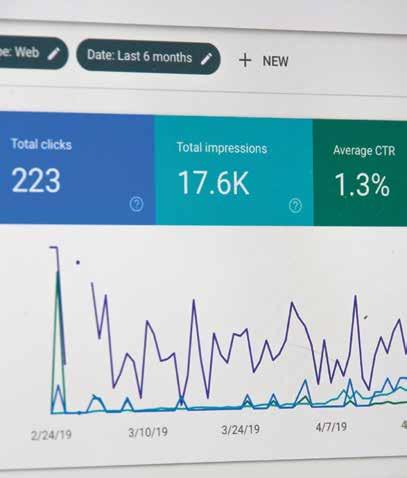
SURREYLAWYER | 23 ARTICLE
Having Difficult Conversations
In November, Surrey Law Society members and subscribers to the Surrey JLD mailing list were invited to attend a free webinar on Having Difficult Conversations –How to Build Positive & Stable Professional Relationships. The session, which was part of the Supporting Surrey programme, was presented by the excellent Joanna Gaudoin and we’re delighted that she has shared some of her top tips from the webinar here.
What’s your approach to difficult conversations? Difficult conversations. None of us can get through life without having them – and they can cause anxiety and stress. It’s important to face up to these conversations and find an approach that works for you. In fact, you might even find that the right approach brings positive results.
Douglas Stone, Bruce Patton & Sheila Heen define difficult conversations as, “Conversations that are hard to have because they involve a topic you care about and/or someone you care about.”

If you think about some difficult conversation situations you have found yourself in, you will see this is true. Typical challenging topics include being unhappy with your compensation package at work, your high performing Associate not getting the promotion you have put them forward for, priorities changing or someone’s behaviour which has impacted you. You can probably think of other examples in your own working life.
Avoiding bringing up topics where we have a point of disagreement, or a negative emotion means that resentment can build. Also, when we think or feel something negative about someone then our brains naturally look for other occurrences to reaffirm those feelings.
Whilst bringing up every little annoyance with your colleagues isn’t really a good idea, if something is likely to have an ongoing impact or be something that could occur again, it is really important to have the difficult conversation you need to with the relevant person or people.
Thomas Kilmann talks about default conflict modes (this relates to your general approach to difficult conversations) and explains

24 | SURREYLAWYER SUPPORTING SURREY
that most people sit in the ‘Avoiding’ category. However, he also says that the only time when it is important to avoid a difficult conversation is when emotions are very high, and the topic would be best left to another day. He also worked through three other modes which are:
‘Competing’ – where you are keen to have the conversation and push your own point of view forward but not keen to cooperate with others. The time to put this mode into place is when there is a crisis situation, or a quick decision is needed, and you are the best person to push forward with your viewpoint.
‘Accommodating’ – this is when you raise a difficult topic and seek to discuss with others but are less likely to push your view to the forefront. This mode is valuable when you want to make sure a topic is raised but you are aware you may not have the best level of information or expertise so will raise it but are very likely to end up giving way to another view.
‘Collaborating’ – when you raise a topic and feel you have an informed contribution to make to the issue. This mode is better implemented when you think you have a similar level of knowledge or expertise to contribute to the topic as others.
Of course, compromise is often touted as a good way forward but in some instances it isn’t possible. You have to make a decision one way or the other.
What is your default conflict mode? When might it be helpful to be in a different mode?
On the premise that you’re going to have a difficult conversation, here are some of my top tips.
Before you have the conversation:
■ Consider as objectively as possible what actually happened in the situation.
■ Reflect on what your role is in the situation, how you may have contributed to what happened which may have influenced other people’s actions or behaviours.
■ Consider what assumptions you have made that have led you to feel the way you do or think the way you do.
■ Take the time to process your emotions and define them.
■ Arrange a time to have the conversation you need to: tacking it onto another meeting is rarely going to result in a successful outcome.
During the conversation:
■ Listen as much as you possibly can.
■ Express your feelings but detail your thoughts from an objective point of view as far as possible and without actively blaming or labelling the other person: such as “You are disorganised”.
■ State any assumptions that have contributed to your view and how you feel.
■ Make it clear you want to resolve the challenge together and where relevant, state you are raising this so that you have good communication and can improve your working relationship.
■ Focus on mutual problem-solving.
After the conversation:
■ Reflect on what you have learnt from the situation.
■ Continue to work on the relationship with the person or people.
This is an extremely complex and difficult topic, that can only really be touched on here. The context of the situation and strength of existing relationships have a big role to play.
I would strongly recommend that you think about how you currently approach, and feel about, difficult conversations and what two to three actions and behaviours you can focus on to move forward from where you are. By focusing on what you can change, you can manage these issues much more confidently, improving relationships and building trust with the people you work with.
About the author
Joanna Gaudoin runs Inside Out Image helping bright, knowledgeable people with great technical skills and experience improve their non-technical skills, so they progress their careers and boost their firm’s performance.


She has run her business for over a decade and has worked with thousands of people including many lawyers, both individually and in groups.
She is also a professional speaker and author of Getting On: Making work work ■
SURREYLAWYER | 25 SUPPORTING SURREY
1 October 2022 PII Renewal for Law Firms
– Still a glimmer of light at the end of the tunnel?
 By Joel Harding, Howden
By Joel Harding, Howden
1October continues to be the most significant date for the renewal of Professional Indemnity Insurance (PII) for SRA-regulated firms. At Howden we are reviewing the data and will present a full analysis in our next Market Report for Law Firms that will be published in January 2023. In the meantime, we are keen to give firms some insight regarding the result and answer the questions many of you are asking right now.
Did premiums increase again?
The short answer is that premiums for the primary £2m or £3m of cover did increase further for those firms renewing their PII on 1 October 2022. But, as with the 1 April 2022 renewal, the reason for this was two-fold. Firstly, most firms had an increase in gross fees for the last completed financial year prior to 1 October 2022. Given that insurers rate on fees, a firm’s gross fee increase therefore translated to a higher premium and across our renewal book this was the reason for the majority of the premium increase that firms saw.
Where insurers were also increasing rate, there was a further uplift in premium. While insurers varied in the amount of rate increase, they set out to achieve across their renewal book, the good news is that we continued to see a flattening of the curve that we saw for the 1 April 2022 renewal. Across our renewal book the increase in average rate was back to single digits. It is encouraging that we are continuing to see a glimmer of light at the end of what has been a very long tunnel.
Premiums for excess layer insurance have risen significantly during the hard market, particularly in relation to those layers up to £10m, which are now more generally seen as “working layers”
as a result of the increase in high-value claims over recent years. While some firms still saw increases at 1 October 2022 this was mainly due to their fee growth and there was more rate stability for excess layer premiums than we have seen since we moved into the hard market. We believe that this is a sign that excess layer underwriters are gaining comfort that their rates are now commensurate with the risk.
Keep talking to your broker as your next renewal approaches so you can stay informed of any further developments or changes. The position will always depend on the profile of your firm (with reference to your claims history and areas of practice in particular), the expectations of your insurer and the wider economic and risk outlook.
There is more good news in that we saw a continuation of the
observed at the 1 April 2022 renewal, with underwriters again showing appetite for quoting new business. While this was generally limited to those firms that insurers perceived to be a good risk due to their work split, claims record and financial strength, it is nonetheless encouraging progress.
This is something we expect will continue through 2023, particularly given that there has been a significant movement of underwriters around the market in recent months. As individual underwriters get their feet under the desk in their new place of work, we anticipate they will be keen to attract those law firms they know to be good, profitable risks based on their past experience.
26 | SURREYLAWYER
Did many firms change their insurer or were insurers focusing on their existing clients and uninterested in quoting for new business?
shift
ARTICLE
Were insurers still worried about conveyancing and limiting the amount of conveyancing work (as a percentage of gross fees) that they were prepared to consider?
Conveyancing work remains in the spotlight, and we saw underwriters continuing to limit conveyancing work as a percentage of overall gross fees when it came to quoting new business. The extent of this differed from insurer to insurer and can be further influenced by the size of a firm.
The restrictions imposed did continue to limit the potential for some firms to secure alternative quotes to compare to the renewal terms they received from their existing insurer. In those instances, it was important for firms to ensure they advanced the best possible renewal presentation to their insurer, including information about additional risk controls they had introduced for conveyancing work – particularly in response to the increase in transactions as a result of the SDLT holiday during the pandemic.
Given how high premiums are, did any new insurers take the opportunity to join the solicitors’ PII market?
While there is nothing significant to report regarding new capacity for 1 October 2022, we suggest you stay tuned for more updates. The introduction of new capacity in the PII market for law firms is currently anticipated in early 2023.
New capacity is a development we have all been waiting for. Coupled with the reshuffle of underwriters amongst existing insurers described above, this is the catalyst we have been hoping will move us on from the hard market. All being well that glimmer of light at the end of the tunnel will get brighter and nearer.
Were insurers asking about work undertaken for sanctioned individuals and entities?
Russia’s invasion of Ukraine has prompted PII insurers (on both primary and excess layers) to ask about work undertaken for sanctioned individuals and entities and also seek a broader understanding of any exposure a firm has to Russian individuals and entities, or work that has involved property or activities in Russia. For some insurers, the concern and enquiry also extended to other countries such as Belarus, Syria and Iran.
These questions first emerged in the lead up to the 1 April 2022 renewal and firms who have not renewed their PII since this development should contact us for further discussion, particularly if your firm currently undertakes work that is likely to fall within the ambit of concern or has done so historically.
Were PII insurers asking about cyber security and wanting to know if firms have separate cyber insurance?
Cyber security is an issue that has been steadily creeping up the agenda for those insurers providing PII to law firms. There is no doubt that law firms, whether big or small, are a target for cyber criminals.
Some underwriters were requiring that firms had safeguards such as MFA and VPN in place as a subjectivity of their quotation for PII. Separate cyber insurance cover was also a requirement in some instances. It is important to remember that while the SRA’s Minimum Terms and Conditions will provide cover for civil liability arising in the course of private legal practice as a result of cyber crime, a separate cyber policy is likewise important. It will provide first party cover, for example enabling you to source the expertise needed to get your systems up and running to resume service to your clients following a hack or outside intrusion.
What are the top 3 issues law firms should put on their agenda to consider as they prepare for their PII renewal over the next 12 months?
It is useful to consider where you should focus your attention and resources in advance of the next PII renewal to ensure you are addressing those issues that insurers are likely to be most concerned about in 2023. This could change depending on any new risks that emerge and the general economic outlook, but at the present time we would highlight the following as the top 3 issues to consider:
1. Financial stability
In Howden’s view, the current economic outlook is going to cause insurers to be even more wary about the financial health of the law firms they insure. If a firm is forced to close, then the PII insurer on cover at the time must provide 6 years of run-off cover, even if they do not receive payment for the run-off premium.
Expect that your financials and future business plans are likely to be the subject of significant scrutiny. If you know this could be an issue, we would suggest you consider reviewing your strategy, including taking professional advice, sooner rather than later. If the numbers don’t look good, you will need to be ready with a story and a plan.
On the flip side, if your firm is in strong financial health, this is a point that you should ensure you emphasise at your next renewal. Don’t just leave it for insurers to work out from the information or accounts you provide. Highlight the point in a covering letter or document – underwriters always like good news.
2. Conveyancing practice
You have heard it all before – conveyancing gives rise to more claims than any other area of practice when it comes to PII for law firms. If we look back to the recessions in 1990 and 2008, we see a significant spike in claims arising from conveyancing. Given the volatility of the current economic position we find ourselves in, firms will need demonstrate to underwriters that the risks associated with conveyancing work have been managed robustly and the potential for claims activity is low.
3. Cyber Security
As explained above this has become a particularly sensitive topic for PII underwriters. Ensure the issue is on your agenda and that you both understand and are meeting the expectations of your PII underwriter.
Our full analysis of the 1 October 2022 renewal will be published in January 2023, together with more information and insight regarding the issues that law firms should focus on when preparing for renewal 2023. In the meantime, please get in touch if you would like to discuss matters further. ■
SURREYLAWYER | 27 ARTICLE
Reflections at the end of COP 27
By Simon Boyle, Solicitor, Landmark Information Group
The 27th Conference of the Parties held at Sharm elSheikh has drawn to a close. As with the previous COPs it has had mixed results. There was a positive development in the agreement to set up the loss and damage fund to help the poorest countries – but overall, it did not deliver that which was urgently needed – a binding target on the big emitters whose economies are still mainly powered by fossil fuels. At the start of the conference Alok Sharma (President of the 26th United Nations Climate Change Conference and British Politician) warned that this was the last opportunity that world leaders had to ensure that the global temperature would not exceed 1.5°C.
But with the failure to agree on binding targets, especially from the three biggest emitters China, US and India, it is looking almost certain that the critical 1.5°C goal set by the Paris COP in 2015 is not going to be achieved.
This should be ringing alarm bells across the world. We are already experiencing the effects of climate change from the 1.1°C rise that we have had so far. And of course, things will get a lot worse once we get to the 1.5°C of warming. But it is at least far better than a 2°C rise within the next 20 years.
That extra half degree additional increase may sound relatively modest but the global effects on both ecosystems and humans would be profound. For example, at 1.5°C of warming 8 % of plants will lose their habitable area but this doubles to 16% at a 2°C rise. A 1.5°C rise is predicted to destroy 70% of the world’s coral reefs but a 2°C rise will wipe them out entirely.
Unlike many environmental issues where there is uncertainty about the state of degradation, with climate change, the critical number of atmospheric CO2 is there for all to see, and it cannot be fudged. As is well known, the pre-industrial level of atmospheric CO2 was 280 ppm and is now at 415 ppm. The worrying thing is that despite all the COPs over the last 27 years, the rate at which CO2 is being pumped out across the world is not decreasing. At the moment the atmospheric CO2 ppm rate is going up by about 2.40 ppm per annum and so should comfortably hit the critical marker of 450 ppm within the next 15 years or so. When that happens, we will be taking the planet into a highly dangerous state of 2°C of warming.
Climate change does not work in a fair way. As a general rule, those that have contributed the least will suffer the most. So, the consequences are tragically unfair because it will be the poorest in the world who will be the most affected. This issue is explored at length in the IPCC Sixth Assessment report in Chapter Eight, Poverty, Livelihoods and Sustainable Development. In paragraph 8.2.1.1 we read the stark warning that ‘risk of extreme impoverishment increases for low-income people experiencing repeated and successive climatic events, whereby before they have recovered from one disaster, they face another impact’.
These impacts will inevitably cause an increase in the number of climate refugees. This can result from land being lost from sea level rises and areas becoming too arid to grow crops or for animals to graze. Sadly, it is very likely that water shortages will lead to conflict in parts of the world which will add to the problem. It is very difficult to predict the number of climate
refugees, but the Institute for Economics and Peace has estimated that 1.2 billion people could be displaced globally by 2050 due to climate change and natural disasters.
Not surprisingly Africa is likely to be the continent whose population is most affected by climate change. The IPPC Sixth Assessment report says (chapter 9) that by 2030, about 250 million people may experience high water stress in Africa, with up to 700 million people displaced as a result. We then need to think where would all these people go. Over the last year, Europe has been highly challenged by migrations of a few million people both from climate change and from the war in Ukraine. But how on earth would we, or could we, manage with an influx of several hundred million.
A final thought is to think about the narrow band that life has to flourish. The average temperature of the earth is around 13.9 degrees and so it can be seen that a 2°C rise would represent an overall warming of around 15%. That will put us all in a very dangerous place that humanity has never had to face before. We, therefore, need to hope that for the next COP in Abu Dhabi there will be a much greater sense of urgency and an acceptance that we are all in this together and that mandatory targets will be essential for all of the world’s leading economies.
Climate change is a reality that demands a series of immediate and concerted responses. If you have been considering where your own organisation might start to respond to both the wider threat of climate change, and to the inherent risks faced by our businesses and clients, our Climate Change white paper is an incredibly good place to start. ■

28 | SURREYLAWYER ARTICLE
Housing Possession Duty Desk
‘The practical guide that is so much more’ – an essential purchase for post-pandemic Britain
Housing Possession Duty Desk – A Practical Guide By Simon Mullings and Sue James. An appreciation by Elizabeth Robson Taylor MA of Richmond Green Chambers and Phillip Taylor MBE, Head of Chambers, Reviews Editor, “The Barrister” and Mediator.
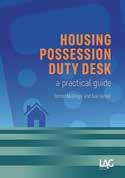
Housing repossession is quite obviously one of the prime causes of homelessness, the human consequences of which are not only horrific, but also –ironically enough – very expensive, particularly for local authorities in ways that are too numerous and complex to be listed here.
Housing law, predictably, is a continually evolving discipline which, for advisers in this area, has become increasingly complex. Fortunately, the Legal Action Group (LAG), the access to justice charity, has come to the rescue –particularly of those threatened with repossession – with clear and authoritative texts on the subject, the best known of which is ‘Defending Possession Proceedings’, which has become the definitive guide to this area of law.
But for those who provide beleaguered tenants or mortgagees with timely and pertinent advice – under strained circumstances and in a large hurry (like 20 minutes before a hearing) – LAG has produced a new title: ‘Housing Possession Duty Desk’, supported by Therium Access.
This new and certainly indispensable guide is aimed at ‘those on the frontline of defending possession proceedings’, namely duty advisers, whether new or experienced, who are ‘faced with the challenge of keeping a roof over peoples’ heads,’ usually at the very door of the court.
The publication of this book is undeniably timely in the time of pandemic and its aftermath, when threats of repossession are reaching record levels. Writing in the foreword, Knowles J points out that ‘there are many, many thousands of possession cases,’ adding that ‘It is too easy to create a conveyor belt, to base assumptions on inferences.’
‘In a fairer system’, write authors Sue James and Simon Mullings, ‘this book might not need to exist.’ In the meantime, tenants and borrowers need help, which is amply provided with erudition and precision in this book, which – in the words of Knowles J – is so much more than a practical guide.
Rather, it is an essential reference, not only for duty advisers, but barristers, solicitors, legal professionals and indeed anyone representing a tenant or mortgagee facing repossession in these difficult times. ■
Legal Action Group – The access to justice charity www.lag.org.uk
Family Law leaves the EU A summary guide for Practitioners
An appreciation by Elizabeth Robson Taylor MA of Richmond Green Chambers and Phillip Taylor MBE, Head of Chambers, Reviews Editor, “The Barrister”, and Mediator.
This new guide from the Family Law imprint of LexisNexis is most welcome at a time when so much confusion reigns in the world caused by the coronavirus pandemic. Any practitioner who is faced with trying to understand where we will be with family law matters on leaving the European Union on the last day of 2020 will be relieved to read this innovative sort work from Professor David Hodson OBE. We welcome the important additional section on public child law written by Maria Murphy for those specialists involved with local authorities.
We feel that this short paperback will be highly relevant to all family law practitioners as a quick accessible guide to the law and practice which will apply on the UK’s final departure from the EU on 31 December 2020. The government has indicated that the UK will not be party to any further EU laws from January 2021, instead relying on existing international laws such as the Hague Convention, to which we will be a party in our own right.
There will also be new provisions to cover issues of national law, where previously EU law existed. Inevitably, some court procedures will need to change once the final break with Europe has taken place. This invaluable title gives us an overview of the legal position and the practical issues which are judged to arise in all areas of family law, including the preparatory steps which lawyers should take in readiness for departure, to advise clients as effectively as possible in the future.
The key topics cover the main substantive family law areas depending on what you are looking for: the governing laws; divorce; financial aspects including remedies; the Hague Convention 2007; the Lugano Convention; private children law; public children law; domestic violence; the service and the taking of evidence, Alternative Dispute Resolution (ADR), and legal aid; and potential areas of EU/UK future co-operation in the post-Brexit era.
When we woke up early on that morning of Friday 24th June 2016, many of us were looking at a most uncertain future. Hodson’s “Family Law Leaves the EU” bridges an important gap for family law practitioners as we grapple with the post Brexit era whilst fighting a world pandemic. Thank you.
Family Law leaves the EU: A summary guide for Practitioners is available now from www.lexisnexis.co.uk ■
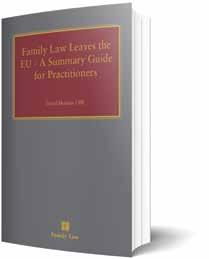
SURREYLAWYER | 29 BOOK REVIEW
Help change an older person’s life
Growing old doesn’t come with a manual and later life can be challenging for many people. The cost of living crisis and rising energy bills is putting an extra burden on people. Our statutory services such as NHS and adult social care are also very stretched which means the demand for Age UK Surrey services continues to grow alongside our ageing population.

People we support today have more complex needs and their situation will be unique. That is why we tailor our support holistically. We help increase people’s income, we aim to reduce loneliness and social isolation, maintain people’s independence, and improve health, wellbeing and resilience.
A gift to Age UK Surrey will help ensure we can continue to deliver a range of one to one support services and group activities that:
■ Provide practical support by helping people understand their options and entitlements through free, impartial and confidential advice on all issues such as housing, care and money.
■ Gives people additional income through benefits they are entitled to but may not be claiming.
■ Give people the gift of friendship and companionship by connecting and introducing them to others through our wellbeing service.

■ Help people remain healthy and connected and learn new skills through social activities, walks and tea and chat groups.
■ Enable people to remain independent at home by offering practical Help at Home support such as cleaning, shopping and gardening.
Age UK Surrey is a local independent charity. Monies gifted to us remain in Surrey which means that a gift will benefit a Surrey resident. Please refer to our charity as ‘Age UK Surrey’. Registered charity number: 1036450. Thank you. ■

30 | SURREYLAWYER 01483 503414 enquiries@ageuksurrey.org.uk www.ageuk.org.uk/surrey Charity No: 1036450 01/23 A gift to Age UK Surrey can help change an older person’s life
your client decides to leave a gift in their will to Age UK Surrey they will be helping people navigate the changes and challenges of later life.
UK Surrey is committed to being there for older people.
If
Age
ADVERTISEMENT FEATURE



LEAP offers cutting-edge, integrated legal technology expanding beyond traditional practice management software. Visit: leap.co.uk PracticeManagement L e gal Publishing DocumentAssembly & Management LegalAccounti n g The Legal Practice Productivity Solution




























 Alastair Logan
Alastair Logan









 By Joel Harding, Howden
By Joel Harding, Howden



















